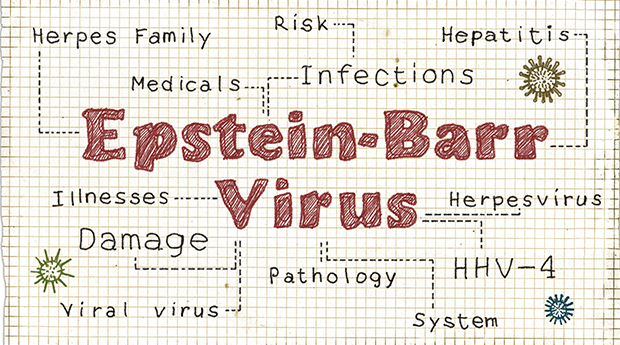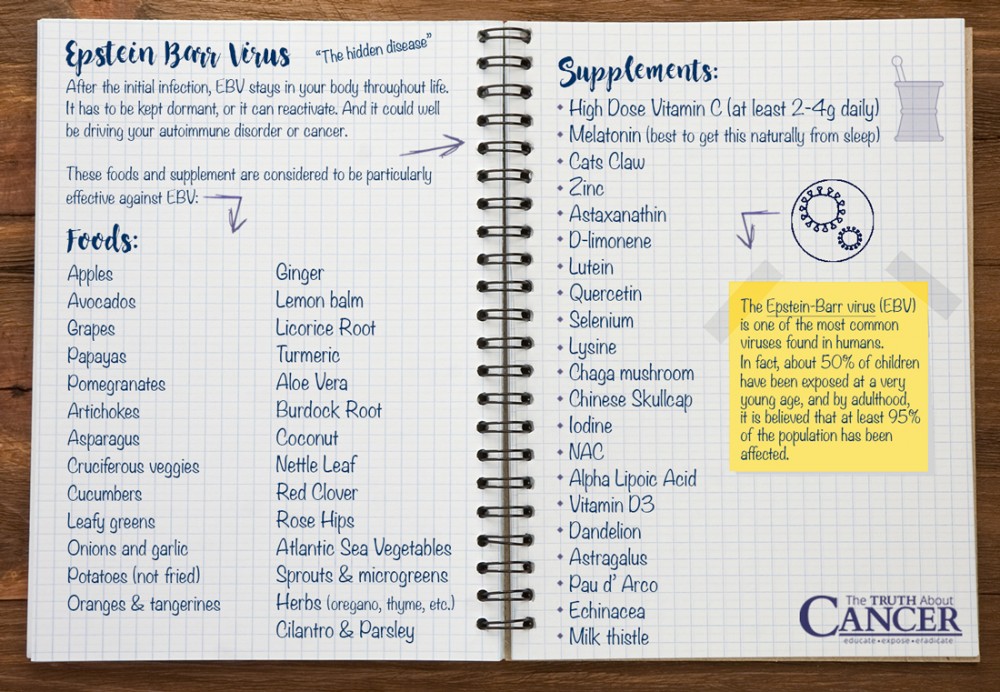& Autoimmune disorders

The Epstein-Barr virus (EBV) is one of the most common viruses found in humans. In fact, about 50% of children have been exposed at a very young age, and by adulthood, it is believed that at least 95% of the population has been affected.
Along with herpes, shingles, and chicken pox, EVB is part of the herpesvirus family (HHV-4 herpes). EBV can cause mononucleosis (the “kissing disease”) but usually it doesn’t. In fact, that is the problem – most EVB infections aren’t noticeable, even when they are active in the body.
While for most people it poses no serious immediate consequences (other than misery from cold-like symptoms and fatigue), it can pose long-term health consequences…
Once you are afflicted with EBV, it never leaves. It remains dormant throughout life. However, there are many triggers that can provide fuel to viruses and other pathogens in the body so that a dormant virus can take advantage and become reactivated. These triggers include exposure to radiation, pesticides, herbicides, paint fumes, and mold.
They can also be related to nutritional deficiencies, physical injury, toxic heavy metal exposure, and emotional trauma. EBV can get reactivated anytime your immune defenses are down.
Women who have gone through a major life change, such as the death of a spouse or even menopause, may be particularly susceptible to the reactivation of the virus. While reactivation does not always present with symptoms, you may experience fatigue, aching muscles and joints, swollen lymph nodes, and other flu-like symptoms. People with weakened immune systems are more likely to develop symptoms when EBV reactivates.
Epstein Barr Virus & Cancer: What’s the Connection?
What you need to know is that herpetic viruses such as EBV are often behind autoimmune disorders such as lupus, MS, and Hashimoto’s thyroiditis. And the EBV could even be fueling your breast cancer.
Doctors rarely look to EBV as a cause of illness as the patient is often asymptomatic of the virus. Yet, a person suffering from a thyroid condition, auto-immune disorder, or cancer likely had a case of mono back in the college days that never really left their system. It just took up a new residence within the body and started causing more serious problems. And it is not just mono, but shingles, herpes, and a myriad of other viruses.
For years, researchers have been linking viruses to the development of cancers such as various lymphomas. Recently, however, the connection to breast cancer has been found to be incredibly strong.
Studies/Researchers have found that 30-50% of breast cancer patients had EBV. Others put the number much higher, as high as 90%. Some research points to the idea that most of the time cancer is caused in part by a virus.
Yet all too often, patients are told that EBV or other viruses can’t be the problem. This may be because blood tests show antibodies that indicate a past infection, not a present one, or that doctors just don’t think to look for it.
EBV and Breast Cancer
In a study published in EBioMedicine in 2016, researchers led by Gerbury Wulf, MD, PhD, of the Hematology/Oncology Division at Beth Israel Deaconess Medical Center, reported that EBV may accelerate the development of malignant breast cancer. The researchers found that breast cells bonded to the Epstein Barr virus and that the virus lowered the threshold for transformation into a particularly aggressive form of cancer.
“We think that if a young woman develops EBV during her teenage years or later, her breast epithelial cells will be exposed to the virus and can be infected. While for most individuals, there will be no long-term consequences, in some the infection may leave genetic scars and change the metabolism of these cells,” explained Wulf. “While these are subtle changes, they may, decades later, facilitate breast cancer formation.”
A study done in 2014 found “a strong association between EBV and breast cancer carcinoma in Sudanese patients, and considerable epigenetic silencing of tumor suppressors that make likely be an outcome or an association with viral oncogenesis.”
The researchers detected EVB in all of the breast cancer biopsies and none in the normal breast tissue biopsies. Breast cancer is the most common cancer in Sudanese women, and interestingly, there is a very low frequency of BRCA mutations in Sudanese breast cancer patients.
Another study published in 2015 found an association between EBV and the development of breast cancer. While the study had inconsistent results, the researchers concluded that EBV and other viruses may play a role at a later stage in the development of breast cancer. They also hypothesized that this could explain elevated IgG levels associated with breast cancer.
Others have postulated that just fighting the virus could exhaust or dampen down the immune response, which might help cancer escape immune destruction.
Numerous other researchers have concluded that the role of EBV in the development and progression of breast cancer as well as in autoimmune disorders cannot be overlooked and should be investigated further.
Cancers have a known cause, and this virus is one of them. Therefore, if your medical team is not aware of this connection, you will need to be your own advocate and take control of your care – which is always a good idea.
What You Can Do NOW to Reduce Your Breast Cancer Risk
Many natural compounds have the ability to suppress viral activation. Any food, supplement, or essential oil that is considered to be anti-viral and/or antibacterial or which can support the immune system and liver can help.
You likely have many of these beneficial herbs & spices, essential oils, and supplements on hand already:
- Cats Claw is powerful against pathogens and viruses.
- Cilantro is fantastic for removing heavy metals. It is also antibacterial and antiviral, so it suppresses EBV.
- Lemon balm is anti-parasitic, antiviral, and antibacterial, which makes it powerful against EBV.
- Licorice root is powerfully antiviral and stops viruses from procreating. It also pushes the virus out of the body creating an environment inhospitable to hosting such viruses.
- Parsley is a strong pathogen-fighter and targets parasites, bacteria, and fungus.
- Turmeric is the ultimate inflammation fighter, including for inflammation in the brain that occurs as a result of EBV.
- Aloe Vera is antiviral, antibacterial, anti-fungal, and anti-parasitic. Studies have shown it to be useful for targeting the pathogens connected with colon, stomach, and rectal cancers.
- Iodine protects the thyroid form viruses such as EBV, so include iodine-rich foods in your diet.
- Burdock root supports the liver so it can remove pathogens.
- Wild foods (foods found growing in nature without being planted by humans) are amazing. They are packed with adaptogens, meaning they are crucial to helping our bodies adapt to whatever life throws us. Wild foods not only retain the vitamin and mineral levels that nature intended, but they also carry critical survival information and mechanisms in their cells. When we ingest them, we benefit from that protection.
- Astaxanathin, lutein, quercetin, and selenium also show powerful protection against EBV activation.
- Vitamin E and selenium supplementation is also a good idea as viruses tend to deplete these essential nutrients.
- Vitamin B12 helps protect nerves and brain from EBV.
- EBV is one of the viruses that trigger NF-kB, and activation of NF-kB has been linked to various cancers. Alpha Lipoic Acid (ALA) has been shown to inhibit NF-kB.
- NAC has also been found to be antiviral and offers significant reduction of NF-kB.
- Vitamin D also inhibits EBV. And like NAC and ALA, it inhibits NF-kB and reduces the resulting inflammation triggered by EBV. (You will find more remedies at the end of this article.) It is important to note that low vitamin D status hinders the immune system response to EBV and cancer. Further, young people with low vitamin D status and high antibody reactivity to the EBV have an increased risk of developing MS.
- Citrus peels have been found to be effective against active EBV. Researchers have found that the d-limonene extracted from the peels suppresses TPA, which is the tumor promotor associated with EBV. Therefore myrtle and lemon essential oils can also be helpful due to the d-limonene they contain.
- Myrtle is also antiviral, anti-inflammatory, and contains other chemo-preventive compounds.
- Ginger also blocks TPA as well as the expression of EVB antigens, thus blocking viral and tumor activity associated with EBV.

Things to Avoid to Minimize Your Risk of EBV & Cancer
Just as important as “what to eat” is what not to eat. If you have symptoms or believe you have active EBV, you may need to avoid dairy, eggs, corn, and wheat until the situation is resolved. I typically recommend avoiding wheat and corn regardless.
Always avoid unhealthy fats and cooking oils such as canola and soybean oils. And remember that genetic expression is turned on or off by lifestyle factors. What you eat, drink, do, and think determines genetic expression. Take charge of your health and your body will thank you.
Remember that after the initial infection, EBV stays in your body throughout life. It has to be kept dormant, or it can reactivate. And as it is likely that you have been exposed to EBV, it would be prudent to include the above recommendations into your daily or weekly diet. As an empowered consumer, you can reduce your risk of EBV wreaking havoc with your health.
Please help bring more awareness about the link between EBV and cancer by sharing this article with your friends and family.
Article source: The Truth About Cancer
Here's to a Healthier You!
Melisa


No comments:
Post a Comment